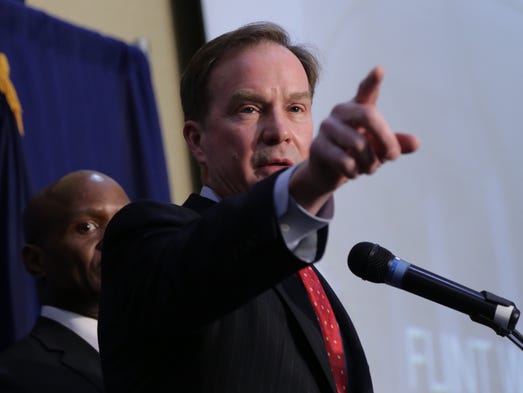
Two legal cases involving egregious harm to public health have moved forward in recent days, though in very different ways. In one case an aggressive prosecutor, defying expectations, filed criminal charges against three individuals and vowed that they “are only the beginning. There will be more to come — that I can guarantee you.” In the other case, a large company reached a deal in which it will pay to modify or buy back hundreds of thousands of defective products.
The case in which the culprits are deservedly having the book thrown at them is the Flint water crisis, while in the other the boom is not yet being lowered on Volkswagen. The first involves misconduct by public officials, the second is a case of brazen corporate crime.
Admittedly, the settlement framework announced in the VW case does not necessarily reflect the full scope of the legal issues facing the automaker in connection with its systematic cheating in auto emission testing. It is not yet known whether the Justice Department’s reported criminal investigation of the matter will result in the filing of charges, nor is it clear whether the civil penalties that may be imposed on VW will come close to the theoretical maximum of $18 billion.
Yet the decision to announce the tentative buyback deal by itself creates the impression that it is the centerpiece of the resolution of the VW case. It’s being estimated that the U.S. buyback would cost the company about $7 billion. If that turns out to be the main cost imposed on VW, the automaker would be getting a bargain.
Causing financial harm to car owners is far from the only sin for which VW has to be held accountable, and it is probably not the most serious one. Of far more consequence are the environmental and public health impacts of the enormous amount of additional pollution that the VW engines have been spewing into the air. What started out as an effort to circumvent regulations will end up causing an unknown number of cases of asthma, bronchitis, emphysema, and possibly lung cancer.
There’s also the issue of deterrence. If VW and its relevant officials do not face serious consequences for their actions, people at other corporations may think they can also flout vital regulations. It’s already clear that VW’s emission fraud was not an anomaly. Mitsubishi just admitted it has been doing the same thing in Japan for at least one of its vehicles.
We don’t yet know the full story of what happened at VW much less Mitsubishi, yet it is likely that flagrant emissions deception arose out of a corporate mindset that sees regulations as obstacles to be overcome rather than legitimate rules designed to protect the public. That mindset will not change until corporations and individuals within them pay as heavy a price for their transgressions as that facing the public officials who poisoned the children of Flint.